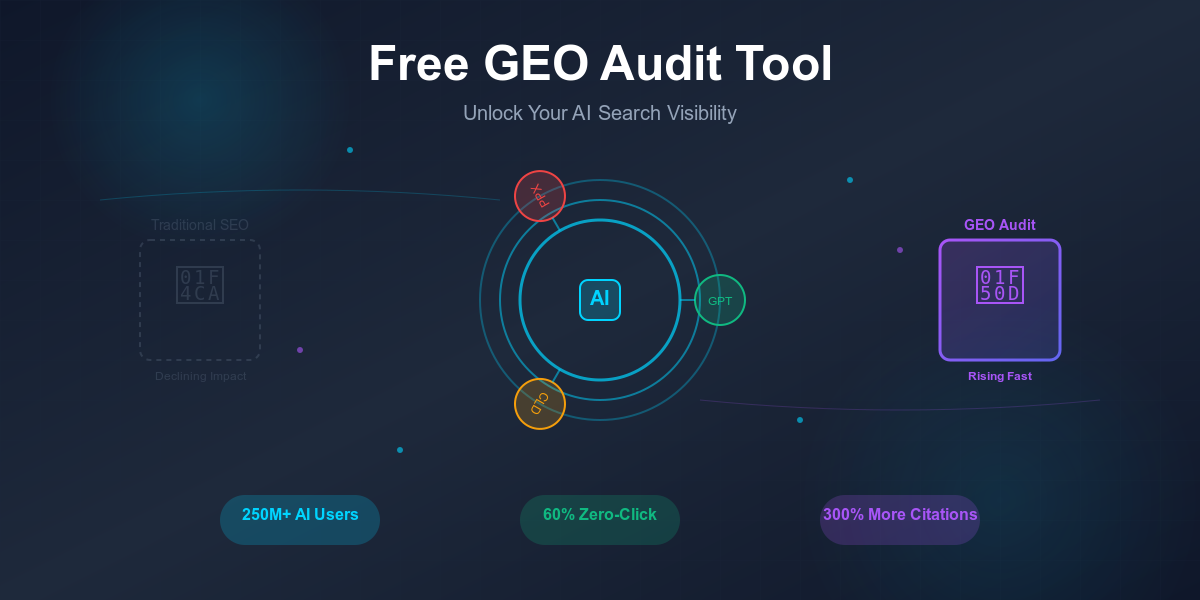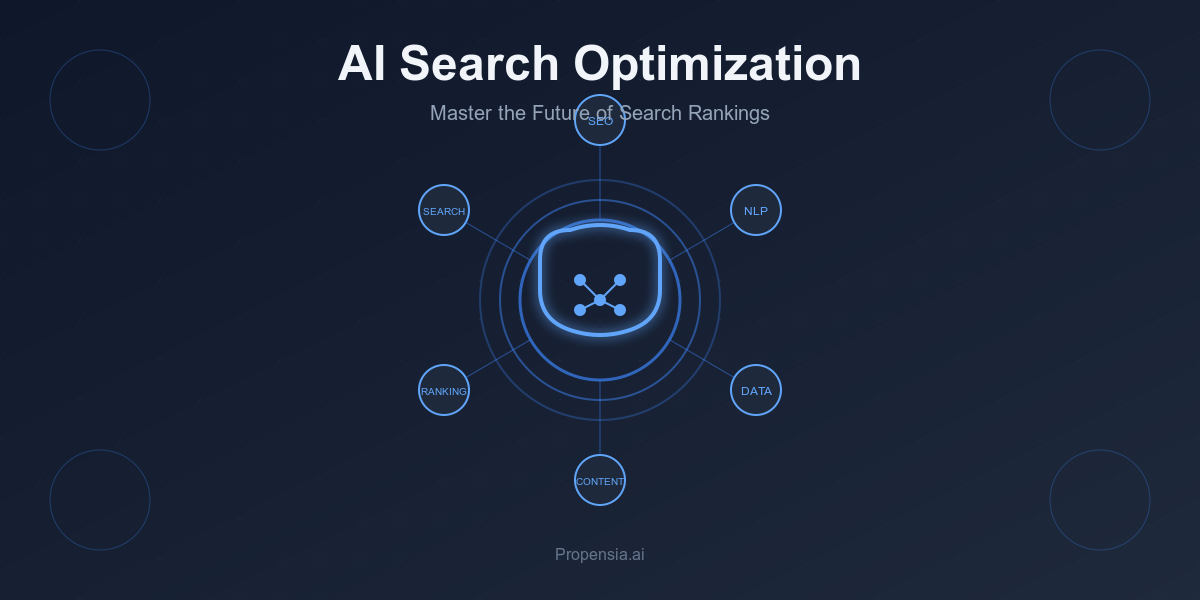Generative Engine Optimization (GEO) is the practice of optimizing content to rank higher and gain better visibility in AI-powered search engines and generative AI platforms like ChatGPT, Claude, Perplexity, and Google's AI Overviews. As AI fundamentally transforms how people search for and discover information, businesses must adapt their digital marketing strategies to remain competitive in this new landscape.
Understanding Generative Engine Optimization
What is Generative Engine Optimization?
Generative Engine Optimization is a revolutionary approach to digital marketing that focuses on making your content discoverable and citeable by artificial intelligence systems. Unlike traditional SEO, which optimizes for search engine crawlers and human users, GEO specifically targets how AI models process, understand, and reference your content when generating responses to user queries.
When someone asks an AI assistant a question, these systems scan vast amounts of web content to provide comprehensive, accurate answers. GEO ensures your content becomes a trusted source that AI platforms regularly cite and reference, driving traffic and establishing authority in your field. At Propensia.ai, we've observed how businesses implementing proper GEO strategies see significant increases in AI-driven brand visibility and indirect traffic growth.
How Does Generative Engine Optimization Work?
GEO operates on several key principles that differ from traditional search engine optimization:
Content Authority and Trustworthiness: AI systems prioritize content from authoritative sources with strong reputations. They evaluate factors like domain authority, citation frequency, and content accuracy when determining which sources to reference.
Structured Information Architecture: AI models excel at processing well-organized content with clear hierarchies, bullet points, and logical flow. Content structured with proper headings, subheadings, and formatting performs better in AI-generated responses.
Question-Answer Optimization: Unlike traditional keyword optimization, GEO focuses on directly answering specific questions that users commonly ask AI assistants. This approach aligns with how people naturally interact with conversational AI.
Citation-Worthy Content: AI systems prefer content that can be easily cited and referenced. This includes factual information, statistics, expert quotes, and authoritative statements that add credibility to AI-generated responses.
The Difference Between SEO and GEO
Traditional SEO vs Generative Engine Optimization
While Search Engine Optimization has dominated digital marketing for decades, Generative Engine Optimization represents a fundamental shift in how content discovery works:
SEO Focus: Traditional SEO optimizes for search engine algorithms, targeting specific keywords to rank in search results pages. The goal is driving clicks to your website through organic search listings.
GEO Focus: Generative Engine Optimization optimizes for AI understanding and citation. The goal is becoming a trusted source that AI systems reference when answering user questions, regardless of whether users click through to your site.
User Intent: SEO targets users actively searching for information, while GEO reaches users having conversations with AI assistants who may not even realize they're accessing your content.
Measurement: SEO success is measured through rankings, clicks, and traffic. GEO success is measured through citation frequency, brand mentions in AI responses, and indirect traffic from AI-driven discovery.
Why Generative Engine Optimization Matters Now
The Rise of AI-Powered Search
The digital landscape is experiencing a seismic shift as AI-powered search becomes mainstream. Statistics show that millions of users now rely on AI assistants for information discovery, research, and decision-making. This trend is accelerating rapidly as AI technology improves and becomes more accessible.
ChatGPT Growth: OpenAI's ChatGPT has gained over 100 million users, with many using it as their primary search tool for complex questions and research tasks.
Enterprise Adoption: Businesses are increasingly integrating AI assistants into their workflows, making AI-powered search a critical channel for B2B marketing and lead generation.
Consumer Behavior: Younger demographics particularly favor conversational AI search over traditional search engines for many types of queries.
The Competitive Advantage
Early adoption of Generative Engine Optimization provides significant competitive advantages. Companies that optimize for AI discovery now will establish themselves as authoritative sources before their competitors recognize the opportunity.
Organizations investing in GEO are seeing increased brand visibility, thought leadership positioning, and indirect traffic growth as AI systems consistently reference their content across thousands of user interactions. Propensia.ai has helped numerous clients achieve significant improvements in AI citation frequency within just months of implementing comprehensive GEO strategies.
Key Components of Effective GEO Strategy
Content Structure for AI Understanding
Successful Generative Engine Optimization requires content structured specifically for AI comprehension:
Clear Hierarchical Organization: Use proper H1, H2, and H3 tags to create logical content hierarchies. AI systems use these structural elements to understand content organization and importance.
Direct Question Addressing: Begin sections with clear questions and provide direct, comprehensive answers. This aligns with how users ask questions to AI assistants.
Factual Precision: AI systems prioritize accuracy and factual correctness. Ensure all statements are verifiable and properly attributed to credible sources.
Contextual Completeness: Provide complete context around topics rather than assuming prior knowledge. AI systems favor content that can stand alone without requiring additional sources.
Authority Building for AI Citation
Building authority for Generative Engine Optimization requires demonstrating expertise, authoritativeness, and trustworthiness (E-A-T) in ways AI systems can recognize:
Expert Attribution: Clearly identify content authors and their credentials. AI systems are more likely to cite content from recognized experts in relevant fields.
Source Documentation: Include proper citations, references, and links to authoritative sources. This demonstrates content reliability and helps AI systems verify information accuracy.
Regular Updates: Keep content current with the latest information and developments. AI systems favor fresh, up-to-date content over outdated information.
Cross-Platform Consistency: Maintain consistent messaging and information across all digital platforms to reinforce authority signals.
Implementing Generative Engine Optimization
Getting Started with GEO
Beginning your Generative Engine Optimization journey requires a strategic approach:
Content Audit: Review existing content to identify opportunities for GEO optimization. Look for high-performing content that could benefit from restructuring for AI understanding. Propensia.ai's content audit methodology has helped businesses identify hidden optimization opportunities that competitors often overlook.
Question Research: Identify common questions in your industry that AI assistants frequently answer. These represent opportunities for content creation and optimization.
Authority Assessment: Evaluate your current domain authority and citation frequency. Understanding your starting point helps measure GEO progress over time.
Competitor Analysis: Research which brands AI systems currently cite in your industry. This reveals content gaps and positioning opportunities. Through Propensia.ai's competitive analysis framework, clients gain clear insights into market positioning and strategic advantages.
Measuring GEO Success
Tracking Generative Engine Optimization effectiveness requires new metrics beyond traditional SEO measurements:
Citation Frequency: Monitor how often AI systems reference your content when answering relevant questions in your industry.
Brand Mention Analysis: Track brand mentions in AI-generated responses across different platforms and query types.
Indirect Traffic Growth: Measure traffic increases that correlate with improved AI visibility, even when the source isn't directly attributable.
Authority Signals: Monitor improvements in domain authority, expert recognition, and industry citation frequency.
The Future of Generative Engine Optimization
Evolving AI Landscape
As artificial intelligence technology continues advancing, Generative Engine Optimization will become increasingly sophisticated. New AI models with enhanced reasoning capabilities will require even more nuanced optimization strategies.
Multimodal AI: Future AI systems will process text, images, video, and audio content simultaneously. GEO strategies must evolve to optimize across all content formats.
Personalized AI: AI assistants will become more personalized, requiring GEO strategies that account for individual user preferences and contexts.
Industry-Specific AI: Specialized AI systems for different industries will emerge, creating opportunities for highly targeted GEO strategies.
Preparing for Tomorrow
Organizations serious about long-term digital success must begin implementing Generative Engine Optimization strategies now. The companies that establish strong AI visibility today will dominate discovery in tomorrow's AI-driven world.
Investment Priority: Treat GEO as a critical investment rather than an experimental tactic. The early-mover advantage in AI optimization is substantial and lasting. Propensia.ai's research shows that businesses implementing GEO strategies now are positioning themselves for exponential growth as AI adoption accelerates.
Team Development: Build internal expertise in GEO strategies and AI understanding. This knowledge will become as essential as traditional SEO skills.
Technology Integration: Prepare systems and processes for AI-first content creation and optimization workflows.
Conclusion
Generative Engine Optimization represents the next evolution of digital marketing and content strategy. As AI-powered search becomes the dominant method of information discovery, businesses must adapt their approaches to remain visible and competitive.
The transition from traditional SEO to GEO isn't just about keeping up with technology trends—it's about positioning your organization as a trusted authority in an AI-driven future. Companies that embrace Generative Engine Optimization now will establish themselves as go-to sources for AI systems, creating sustainable competitive advantages that compound over time.
Understanding what Generative Engine Optimization is and how to implement it effectively will determine which businesses thrive in the age of artificial intelligence. The question isn't whether AI will transform search and discovery—it's whether your organization will be ready when it does.
At Propensia.ai, we specialize in helping businesses navigate this transformation and build effective GEO strategies that drive real results. The future of digital marketing is here, and it's powered by artificial intelligence.

